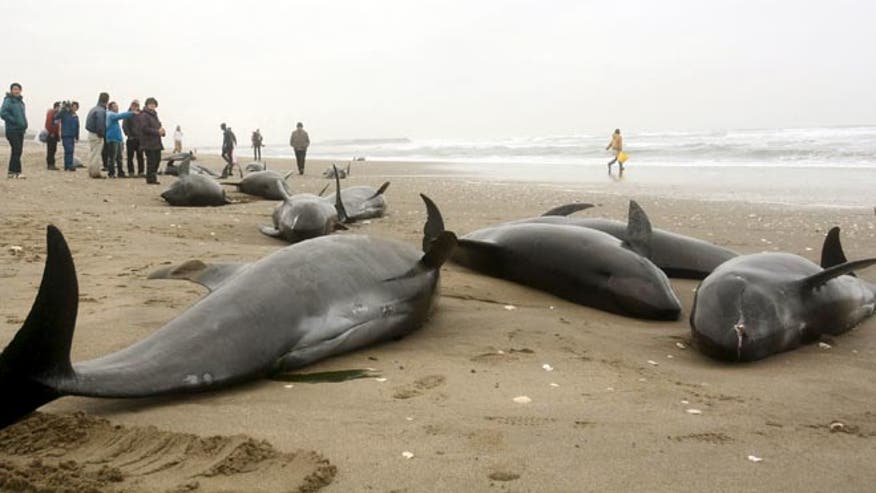Japan’s Dolphin Hunt Poses Threat to Olympics

But just as China faced uncomfortable attention over its poor human rights record and severe pollution, Japan is also facing growing, global condemnation of its fishermen who conduct a shockingly gruesome annual slaughter of dolphins known as the Taiji dolphin hunts. The mammals are rounded up and killed in what has been called a bloodbath, spotlighted in the documentary The Cove. Dolphins are counted among the world’s most perceptive and intelligent mammals besides humans, zoologists and experts have repeatedly said.
Recently, Japan was hit with an embarrassing ouster by the world’s leading zoo organization, the World Association of Zoos and Aquariums (WAZA), whose influential members include the London Zoo, the Zoological Society of San Diego, Toronto Zoo, Bronx Zoo and Melbourne Zoo. The oversight body suspended the Japanese Association of Zoos and Aquariums (JAZA) after a unanimous vote by its council and in a statement said: “The basis for the suspension is a determination that JAZA has violated the WAZA code of ethics and animal welfare. Moreover, WAZA council reaffirmed its position that members must confirm that they will not acquire dolphins from the Taiji fishery.”
Dolphins are herded into shallow waters and then are either stabbed to death or picked for public display in aquariums ($125,000 per dolphin). The practice is in violation of Japan’s own animal cruelty laws, experts have said. Japan’s coast guard is often assigned to protect the twelve boats that are typically involved in the annual kill. Dolphins are then shipped off to places like the Middle East, Russia, South Korea, China, and The Philippines.
More than 18,000 dolphins have been killed at Taiji’s harbor pens since 2000, watchdog groups say. Most of the dolphins are butchered on-site for food ($500 per dolphin), despite the high mercury concentrations found in dolphin meat which can lead to neurological problems, including impaired motor skills as well as migraines. Restaurants around the world sell dolphin and whale sashimi and blubber, along with tuna and shark-fin soup.
The New York Times has reported that dolphin meat "is hardly a vital food source: only a minority of Japanese eat whale, and dolphin is even less common...." The Times also reported test results of dolphin meat that "found mercury levels ranging from 10 to 100 parts per million, far above the Japanese government's advisory level of 0.4 parts per million."
“These are not Japan’s dolphins to steal, they are innocent, migratory dolphins often miles out in the ocean who have the bad fortune to be swimming near Japan’s waters,” Says Marnie McBryde, a real estate developer and a former partner at Spencer Stuart, an executive search firm. She has recruited corporate executives for major blue-chip corporations, and lived in Japan representing the firm for ten years.
In January 2014, Caroline Kennedy, the United States ambassador to Japan, tweeted: “Deeply concerned by inhumaneness of drive hunt dolphin killing. USG [U.S. government] opposes drive hunt fisheries.” Yoko Ono Lennon has already sent an open letter to the Japanese fishermen of Taiji which warned them that they “will make the children of the world hate the Japanese.”
Marine conservation activists Sea Shepherd applauded JAZA's suspension for its “role in Taiji’s horrific massacre of wild cetaceans,” noting in a statement: “These highly intelligent, sentient and socially complex marine mammals belong in the open ocean where they can engage in their natural behaviors and live in their natural family groups – not performing tricks for food in concrete bathtubs while being subjected to loud music and noisy crowds.”
Sea Shepherd's Melissa Sehgal, who has monitored the killings of dolphins in Japan, has told Reuters: "It takes up to 20 to 30 minutes for these dolphins to die, where they bleed out, suffocate or drown in the process of being dragged to the butcher house."
McBryde has been so concerned about Japan’s slaughter of dolphin, that earlier this year the executive funded a billboard that appeared on the Long Island Expressway outside the Queens Midtown Tunnel heading out of New York City which read “Japan’s Shame: Stop Killing Dolphins.” McBryde says: “This slaughter is driven by greed.”
Elizabeth MacDonald joined FOX Business Network (FBN) as stocks editor in September 2007 and is the author of Skirting Heresy: The Life and Times of Margery Kempe (Franciscan Media, June 2014).
Follow Elizabeth MacDonald on Twitter @LizMacDonaldFOX.











































No comments:
Post a Comment